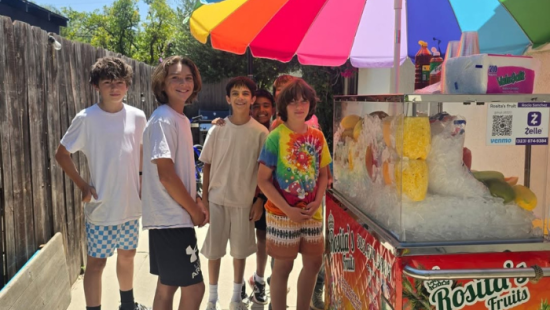Giovani has worked his entire life. He grew up in an environment filled with hardship, and he overcame it. He managed to find a successful business and family path.
“There are thousands of immigrants who have lived an experience like mine,” Giovani tells me… just Giovani, no last name. We won’t provide more information due to the current climate in the country.
But it’s hard to imagine a six-year-old child working as a construction laborer, with the sole desire of helping his mother after his father left. You can picture this child mixing lime, carrying buckets, and contributing however he could to a construction project.
“We had to pitch in; life was hard, there wasn’t much money, and there were many expenses to cover,” says the California resident.
Years later, around age 12, he went to work at a mechanic shop. He was already living on his own, trying to survive, trying to find a space that could give him a sliver of hope. The shop owner offered him a corner in the building where he could sleep, and where, surely, he dreamed about what life might have in store for him.
“I learned everything there. They had me doing all kinds of tasks. I learn quickly, I’m very persistent, I like to learn,” he adds.
Together with a relative his age, they soon had to seek new horizons. Both were mechanics and knew enough, so they rented a space and opened their own mechanic shop. It was his first business venture, from which he learned a great deal.
“I had a problem with my relative and left the shop. Everything was under his name, and he kicked me out,” he says.
Years later, he met his father, which brought him great joy. His mother had died, and at least now he had one close relative. However, tragedy struck. His father was murdered, and the perpetrators threatened to do the same to the rest of the family.
“I didn’t know what to do. My sister told me I had to flee, that they would kill me. So, I took advantage of another relative’s migration to the U.S. and joined him. I only had $75, that was all I had for my journey through Mexico. Later, some relatives in California offered to pay for my border crossing. That’s how I got to California,” he adds.
It was blow after blow: first losing his mother, then his father, and then the business he had put time, effort, and money into. Things weren’t much better in Mexico. Like many other migrants, he suffered violence and assaults.
“But I made it. I worked in a seafood restaurant, but I didn’t last long. Then, I got a job at a bag factory. I put in a lot of effort there, and little by little, the owners began to notice me. They offered me English classes, then advanced training on the workshop machines, and eventually a better position. I like learning—I pick things up quickly,” he says.
There are many stories that show how Giovani gained the trust of the business owners. He learned to operate the machines to perfection; the factory practically depended on his work.
That curiosity led him to learn how to repair electrical appliances. At first, he did it while still working at the factory. He visited various repair shops and offered his services. One of them gave him a chance, and after that, nothing could stop him. If he didn’t know something, he’d learn it. His clientele grew, and soon he couldn’t keep up with the demand.
“It was incredible. First, I did it from my house, then out of my car. I’d get calls and go straight to people’s homes to fix what they needed. Eventually, I had to make a choice and quit the factory,” he says.
One day, he met someone who later became his business partner—a man of Arab descent who owned an electronics shop in a Latino mall (name withheld due to the current political climate).
“I need someone bilingual,” they told Giovani. And he was the right person.
“They didn’t do repairs, but customers would come in and ask. When I saw that, I told them yes, I offered my services, and told my then-boss that we should be partners,” he says.
It was tough convincing him. His boss wanted to focus on other things, but Giovani’s persistence—and the arrival of a decent amount of money—won him over.
“That’s how we started expanding our market. Then my partner’s brother came back from the war in Afghanistan and joined the business. He took over my original partner’s role. One day he invited me out with some friends; they were going to eat Nashville Hot Chicken. I decided to go. The food was different, good, but missing something. I mentioned it, and he took me to two other places. Another friend of theirs, of Armenian descent, joined us. The three of us started experimenting. One day they said, ‘What if we opened a restaurant?’ I was surprised, but I saw it as a chance to learn. Everything moved quickly. We found a good location in the same mall, equipped it, found the best recipes, and that’s how Mean Chix (Nashville Hot Chicken) was born. We’re great partners, I love working with them, and the food has been a success,” he adds.
Giovani still can’t believe his story—the journey of a child construction worker who now owns multiple businesses in California.
“God knows why He does things. He put me to the test. He took my mother, my father, my siblings. The price has been very high to live in this country,” he says.
Given the current immigration climate in the United States, it saddens him.
“It shouldn’t be this way. We, the ones who have businesses, provide jobs for many people, many families. What I ask of God every day is to make all migrants invisible—to protect them from those who want to harm us. The community must walk hand-in-hand with God and be kept safe from danger,” he concludes.








